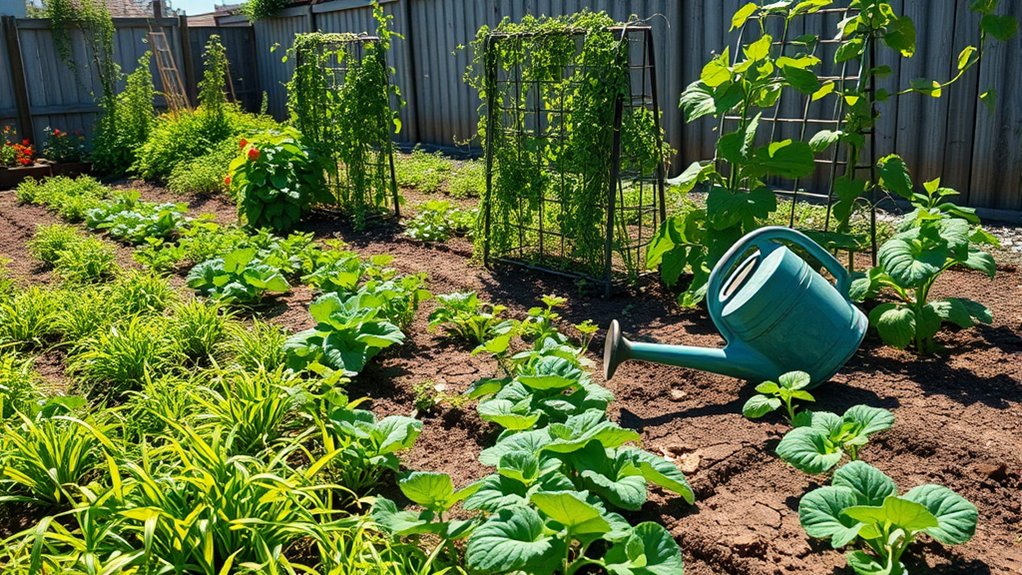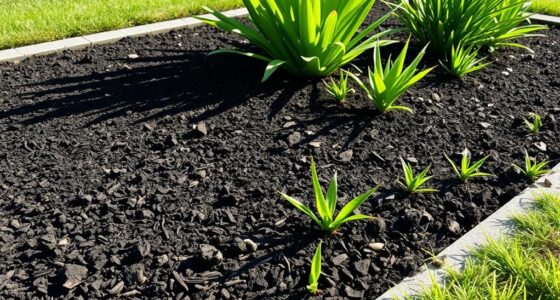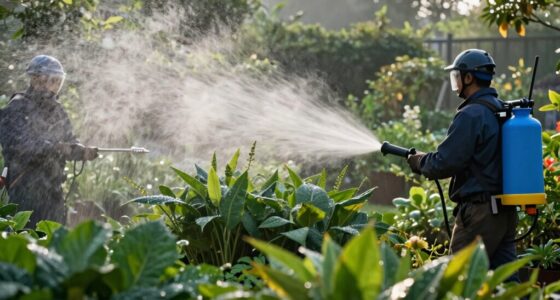To avoid common beginner gardening mistakes, start by testing and preparing your soil properly, adding amendments like lime or sulfur as needed. Don’t forget to establish a regular watering schedule that balances moisture, and always inspect plants for pests early. Keep your garden tidy and prevent problems before they start by using natural pest controls and good hygiene. If you keep these tips in mind, you’ll set a strong foundation for a thriving garden—you’ll find out more on how to succeed.
Key Takeaways
- Test and amend soil pH and nutrients before planting to ensure a healthy foundation.
- Implement pest prevention strategies early, including beneficial insects and garden cleanliness.
- Water plants consistently, checking soil moisture to avoid overwatering or underwatering.
- Prepare the soil properly and avoid rushing into planting without a solid garden foundation.
- Use integrated pest management and natural controls instead of relying solely on chemicals.

Starting a garden can be exciting, but beginners often make common mistakes that can hinder their success. One of the most important steps you might overlook is soil preparation. Without proper soil prep, your plants won’t have the nutrients they need to thrive. Instead of rushing to plant, spend time testing your soil’s pH and nutrient levels. If it’s too acidic or basic, add amendments like lime or sulfur to balance it out. Loosen the soil to improve drainage and aeration, which helps roots develop strong and healthy. Don’t just dig a hole and plant—think of your soil as the foundation of your garden. Well-prepared soil will give your plants a better chance at growth, reduce the risk of diseases, and increase yields.
Another common mistake is neglecting pest control from the start. Many beginners don’t realize that pests can quickly become a serious problem if left unchecked. Instead of waiting until you see damage, take preventative steps early on. Use natural pest control methods like introducing beneficial insects, such as ladybugs or praying mantises, which prey on common pests. Cover vulnerable plants with row covers or netting to keep pests away. Keep your garden tidy by removing dead leaves, weeds, and debris that attract pests and harbor diseases. Regularly inspect your plants for signs of infestation so you can act swiftly before they spread. Additionally, utilizing integrated pest management strategies can help minimize chemical use and promote a healthy ecosystem. By integrating pest control into your gardening routine, you’ll protect your plants without resorting to harsh chemicals, which can be harmful to beneficial insects and your environment.
Many beginners also ignore the importance of proper watering and soil moisture. Overwatering can drown roots and promote fungal diseases, while underwatering causes stress and stunted growth. Learn the specific needs of your plants and check soil moisture regularly. A simple way is to stick your finger into the soil; if it feels dry a couple of inches below the surface, it’s time to water. Consistent watering helps prevent stress and keeps plants healthy. Also, avoid watering during the hottest part of the day, which can cause evaporation and leaf scorch. Establishing a steady watering schedule tailored to your plants and local climate can make a significant difference in your garden’s success.
Frequently Asked Questions
How Do I Choose the Right Plants for My Climate?
When choosing plants for your climate, start with soil testing to understand your soil’s type and nutrient levels. Use this information to guide your plant selection, opting for species that thrive in your local conditions. Consider your climate zone, sunlight, and moisture levels. By matching plants to your environment, you’ll increase your chances of a successful garden and minimize the need for extra care or adjustments later on.
What Are the Best Methods to Control Pests Naturally?
You can control pests naturally by practicing companion planting, which involves pairing plants that repel pests with those they target. Additionally, attract beneficial insects like ladybugs and lacewings, which feed on pests, by planting nectar-rich flowers nearby. Avoid chemical pesticides, as they harm helpful insects and disrupt your garden’s balance. Regularly inspect your plants and remove pests by hand when possible, promoting a healthy, pest-resistant garden ecosystem.
How Often Should I Fertilize Different Types of Plants?
Imagine your plants thriving, but their growth stalls unexpectedly. The secret lies in plant nutrient timing and choosing the right fertilizer types. You should fertilize most plants every 2-4 weeks during active growth, but tropical plants may need more frequent feedings. Always follow specific instructions, and adapt based on plant response. Proper timing and fertilizer choices ensure your garden stays lush, vibrant, and healthy, avoiding those common beginner pitfalls.
What Tools Are Essential for Beginner Gardeners?
For beginner gardeners, essential tools include a watering can or hose to maintain a consistent watering schedule, a trowel for planting, and pruning shears for trimming. Don’t forget a soil testing kit to monitor your soil’s health, ensuring your plants get the right nutrients. These tools help you stay organized, promote healthy growth, and avoid common mistakes like overwatering or poor soil management.
How Can I Extend My Growing Season Effectively?
To extend your growing season effectively, start with season extension techniques like using row covers, cold frames, or greenhouses to protect plants from early frosts. Practice crop rotation to maintain soil health, which promotes healthy growth longer into the year. Keep an eye on weather forecasts and be ready to cover or move plants as needed. These strategies help you maximize your harvest and enjoy fresh produce well beyond the typical growing period.
Conclusion
Avoiding common gardening mistakes can make your plants thrive and your experience more enjoyable. Did you know that over 70% of beginner gardeners give up within the first year due to simple errors? By learning from these mistakes and staying patient, you’ll build confidence and create a beautiful garden. Remember, every mistake is a chance to learn. Keep experimenting, stay consistent, and soon you’ll be proud of your lush, healthy plants.









